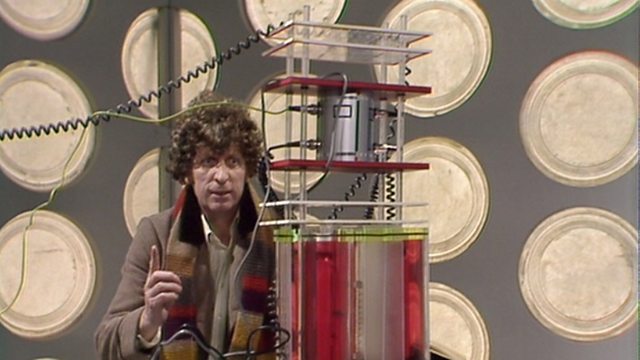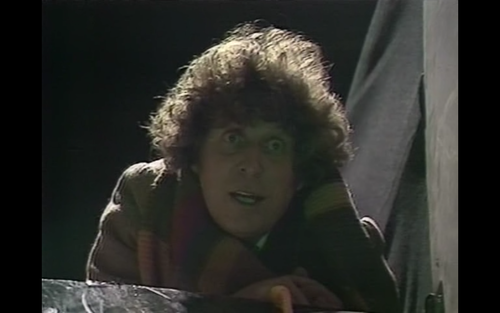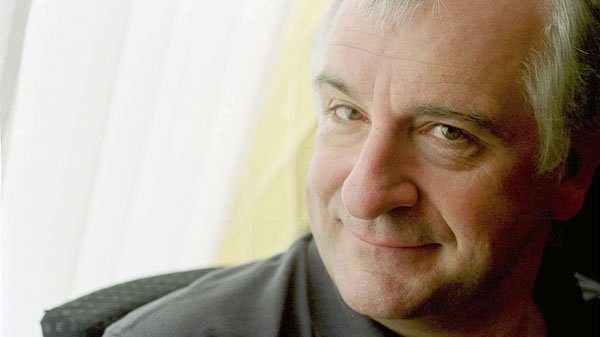Douglas Adams was recommended for the Doctor Who Script Editor’s job by his predecessor Anthony Read, and accepted the job after meeting with producer Graham Williams.
This was around September/October 1978. Williams was recovering from illness that meant he was unable to carry out his role during the filming of The Power of Kroll. It was after the broadcast of the first Hitchhiker’s Guide to the Galaxy Radio series, but shortly before broadcast of the Christmas Episode (usually packaged as the first episode of the second radio series).
So there was a lot going on. Read had recommended a writer whose debut script had been devised in a barrage of ideas, most of which were excised for feasibility reasons – they wouldn’t fit into a four part Doctor Who story, let alone the same four part Doctor Who story.
Read had spent a considerable amount of time editing them as Adams was busy writing the rest of Hitchhiker’s after the success of the pilot, and the scripts were overlong and clearly the work of writer inexperienced in drama. Graeme McDonald, the Head of Serials and Williams’ boss, was very much against using Adams’ scripts as he believed they were too comedic.

All of which begs the question: why was Adams put forward as a Script Editor? Adams was told he was wanted because of his ideas, that he could make Doctor Who his own.
In the end he wasn’t able to exert that much control, and left to focus on his own scripts as it brought him more joy.
It’s impossible to say how genuine this offer of shaping the show to Adams’ ideas was, but certainly the need for a script editor was pressing. It seems surprising that Graeme McDonald would accept Adams in the role unless there simply wasn’t anyone else available.
From the previous season’s writers, Robert Holmes had already done the job, Bob Baker and Dave Martin had split as a writing duo (and offered similar problems to Adams in terms of writing discipline), leaving only David Fisher and Adams. One can only assume the script for the first Hitchhiker’s episode impressed Anthony Read enough to put Adams top of the list.
From Adams’ point of view in accepting the job, he was due to be incredibly busy, but crucially he was a huge fan of the show. Having experienced a long period without work, you can hardly blame Adams for trying to ensure jobs kept coming in, especially when one of his favourite shows was involved.
Essentially, Doctor Who and Douglas Adams didn’t mesh immediately, and were never going to. Adams’ comedy influence on the show was leaning towards the Ministry of Silly Walks side of Python, absurdity delivered with a straight face. However, Season 17 also had moments of Terry Jones in drag screaming ‘Ooh, I wet ‘em’.

While this works in a comedy sketch show format, it has selective appeal in Doctor Who. It also illustrates the clash of styles when the show veers between Adam’s knowingly silly regeneration scene for Romana, and the pulp barebones grimness of a rushed Terry Nation script. Adams himself said one series wasn’t enough time to reduce Doctor Who’s sheer momentum enough to allow him to have more of an impact.
While Adams tried to find new writers, he ended up with Nation, David Fisher, Bob Baker and Anthony Read – someone who had first written for Doctor Who in 1963, two of the previous season’s writers and last season’s script editor. As with Read’s time on the show, Adams was unable to find new voices who could write to the standard required and was unable to make such scripts work himself.
Anthony Read’s scripts for The Horns of Nimon were not regarded as good enough by Graham Williams, but there was nothing else that could be used. It needed someone of Read’s experience, someone focussing only on Doctor Who, to find and develop a new writer in the way Read had done for Douglas Adams.
It didn’t help that the production had grown more stressful. Not only had Tom Baker been encouraged by Adams to essentially play the role as himself, but new Romana actress Lalla Ward was just as confident as Baker in asserting her ideas for the character and show.
Established directors clashed with the lead actors/the tone/the technical demands/the unions, and all the while inflation spiralled. A high pressure situation led to mistakes, which could mean reshoots that cost more than they did the week before. Williams left, and Adams left with him, convinced he wouldn’t have the time to dedicate to Doctor Who with Hitchhiker’s taking off and frustrated by his inability to change the show.
Adams arrived approximately thirty years too early for Doctor Who. Since 2005 the Script Editor role is more about the nuts and bolts of the script, while the Show Runner develops story ideas and has more of a say in both tone and editing. We can only judge a pure undistilled version of Douglas Adams show running Doctor Who as a hypothetical, because the season he did work on is a clash of styles.

While it is similar in tone to the previous season, it has a distinctive edge due to Adam’s input. For all that Adams felt like he was unable to change the show, his time on it was divisive among fans, both beloved and derided moreso than any other Graham Williams’ series.
As a result, it did significantly influenced what was to follow.
The new production team would see Season 17 as something to react against.

